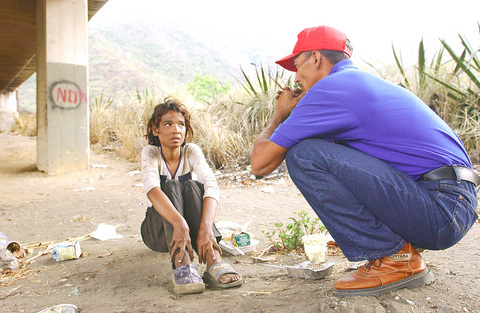Beneath bridges and overpasses, the homeless people of Caracas are spending the holidays in encampments of cardboard and discarded wooden palettes.
Venezuelan President Hugo Chavez has pledged to do away with homelessness in the country through an aggressive outreach program that is offering street people communal housing, drug treatment and a modest stipend.
But while the government says it has helped thousands, others remain on the streets, presenting a formidable challenge to the newly re-elected Chavez as he aims to make good on a promise to fix an entrenched and complex problem.

PHOTO: AP
Luis Mavares, a scrawny man of 37 who has lived under a highway offramp for 11 years, said government social workers had offered to take him to a rehabilitation center, but he refused.
"I know they're doing something good, but it's not for me," said Mavares, who sleeps on an old mattress next to the trash-strewn Guaire River and says personal problems left him exiled from his family.
"I don't like to be caged in," he said.
Others say they have received life-changing help from the state program Mission Negra Hipolita, named after the nanny of Simon Bolivar, the South American independence hero who is idolized by Chavez.
The program guides the homeless to shelters and rehabilitation centers, offering them medical and psychological care. Those who join can receive a paycheck equivalent to US$65 a week for community service work like clearing weeds or painting murals with slogans like "Say no to drugs, search for Christ."
"For me, it's bringing results," said participant Marco Barrios, 50, who worked cutting tall grass on a roadside recently and said the program is helping him break an addiction to crack cocaine through discipline and daily prayer.
Chavez, a fierce critic of the US government who was re-elected on Dec. 3, has started a range of social programs aimed at aiding the poor and drawing on Venezuela's oil wealth.
"This revolution cannot allow for there to be a single child in the street ... not a single beggar in the street," Chavez said earlier this year, acknowledging homelessness is a difficult problem in countries across the world.
Venezuela's program began nearly a near ago and is headed by a retired general, former defense minister Jorge Garcia Carneiro, who says many participants are adopting more normal lives despite struggles with drug abuse.
Last month, he said more than 9,000 people were being helped by the program.
Carneiro's ministry said an estimated 800 people remain on the streets in Caracas.

VAGUE: The criteria of the amnesty remain unclear, but it would cover political violence from 1999 to today, and those convicted of murder or drug trafficking would not qualify Venezuelan Acting President Delcy Rodriguez on Friday announced an amnesty bill that could lead to the release of hundreds of prisoners, including opposition leaders, journalists and human rights activists detained for political reasons. The measure had long been sought by the US-backed opposition. It is the latest concession Rodriguez has made since taking the reins of the country on Jan. 3 after the brazen seizure of then-Venezuelan president Nicolas Maduro. Rodriguez told a gathering of justices, magistrates, ministers, military brass and other government leaders that the ruling party-controlled Venezuelan National Assembly would take up the bill with urgency. Rodriguez also announced the shutdown

Civil society leaders and members of a left-wing coalition yesterday filed impeachment complaints against Philippine Vice President Sara Duterte, restarting a process sidelined by the Supreme Court last year. Both cases accuse Duterte of misusing public funds during her term as education secretary, while one revives allegations that she threatened to assassinate former ally Philippine President Ferdinand Marcos Jr. The filings come on the same day that a committee in the House of Representatives was to begin hearings into impeachment complaints against Marcos, accused of corruption tied to a spiraling scandal over bogus flood control projects. Under the constitution, an impeachment by the

Exiled Tibetans began a unique global election yesterday for a government representing a homeland many have never seen, as part of a democratic exercise voters say carries great weight. From red-robed Buddhist monks in the snowy Himalayas, to political exiles in megacities across South Asia, to refugees in Australia, Europe and North America, voting takes place in 27 countries — but not China. “Elections ... show that the struggle for Tibet’s freedom and independence continues from generation to generation,” said candidate Gyaltsen Chokye, 33, who is based in the Indian hill-town of Dharamsala, headquarters of the government-in-exile, the Central Tibetan Administration (CTA). It

China executed 11 people linked to Myanmar criminal gangs, including “key members” of telecom scam operations, state media reported yesterday, as Beijing toughens its response to the sprawling, transnational industry. Fraud compounds where scammers lure Internet users into fake romantic relationships and cryptocurrency investments have flourished across Southeast Asia, including in Myanmar. Initially largely targeting Chinese speakers, the criminal groups behind the compounds have expanded operations into multiple languages to steal from victims around the world. Those conducting the scams are sometimes willing con artists, and other times trafficked foreign nationals forced to work. In the past few years, Beijing has stepped up cooperation